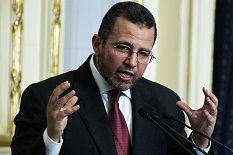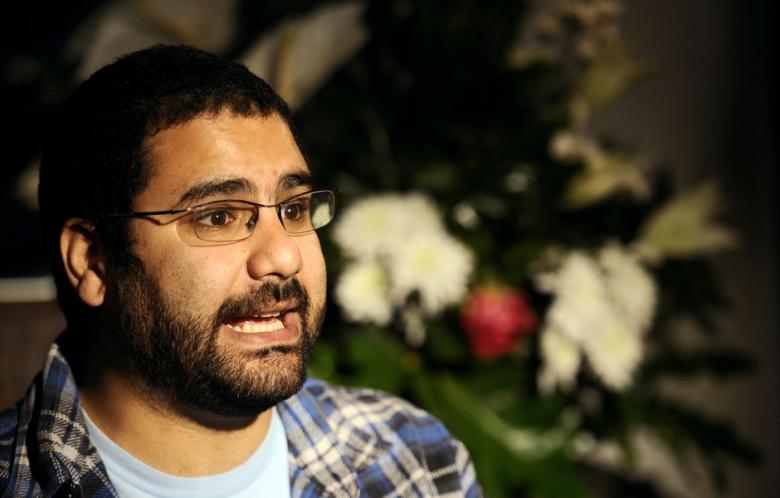By Heba Hesham
CAIRO: Liberal groups said on Friday that they were back to square one in a struggle with Islamists over the drafting of a new constitution a day after most parties agreed on a “compromise.”
Some 14 parties had agreed on Thursday in a meeting with the ruling military council to boost their representation in the Islamist-dominated constituent assembly, but one of the dissenting parties said the agreement had no teeth and an entire shake-up of the panel was needed.
“It was an attempt to give the impression there was an agreement, and that the military council did what it had to do,” said leftwing Tagammu Party leader Refaat Al-Said.
He said a moderate Islamist party and the liberal Al-Wafd Party had proposed that the Freedom and Justice Party (FJP) — political arm of the dominant Muslim Brotherhood — give up 10 of its seats on the panel for other groups.
He said few liberal and secular-leaning parties had refused to sign the agreement.
Al-Wafd, the country’s oldest liberal party, signed off on it.
“(FJP leader Mohamed) Morsi said that the (agreement) would be a recommendation, and he couldn’t promise anything,” Al-Said said.
The proposed “compromise” would see elected substitutes fill the 10 seats which Islamists will give up.
The parliament, which evenly divided the Constituent Assembly between parliamentarians and public figures, had voted for 40 back-up members who could replace members who can’t or refuse to participate.
Liberals, leftists and other religious institutions had walked out of the panel elected by the Islamist-majority parliament, denouncing their meager representation and the domination of the assembly by Islamists. Others criticized the lack of clear criteria through which representatives of different sectors were selected.
Five parties opposed the compromise between the MB, SCAF and other parties. The five include the Free Egyptians Party (FEP), Al-Adl, Al-Karama and Democratic Peace parties, the official Middle East News Agency (MENA) reported, quoting MP Mostafa Bakry, who read out the meeting’ final statement.
A statement by the FEP said that Ahmed Said, head of the party, refused to sign the meeting’s recommendations because the party refuses to manipulate the political future and the civic national identity of the Egyptian state or to make any deal or compromise at the expense of the people and the principles of the revolution.
“We refuse this patch up that changed nothing of the actual make-up of the panel,” said Nabil Zaki, journalist and spokesman of Al-Tagammu. “The Islamists still want to control the to-be drafted constitution by saying they are the majority. We have fears that they won’t preserve the status of Egypt as a civil state in the constitution”.
Al-Adl MP Mostafa Al-Naggar said this decision is legalizing the mistake of the majority.
Researcher and analyst at Al-Ahram Center for Political and Strategic Studies, Nabil Abdel Fattah, said that this is not an adequate solution.
“The new formation would still be from the same condemned selection,” he said.
The 14 parties that approved the decisions taken at the meeting also agreed to consider both the documents of Al-Azhar and the Democratic Alliance, the FJP-led electoral coalition, as the reference for the work of the Assembly that would draft Egypt’s new constitution.
The 1971 constitution was suspended after the overthrow of former President Hosni Mubarak in a popular uprising last year.
“This talk is not binding to the Constituent Assembly. They can either take it or leave it,” Zaki said.
The attendees agreed to include constitutional articles that would ensure the freedoms of thought and worship, to criminalize discrimination on the basis of religion, race or gender and support the national unity in the coming constitution.
According to Bakry, a number of specialized committees would be formed to aid the panel in its task by providing expertise in the preparation and drafting of the constitution, review the drafted articles so as to ensure balance and to achieve the national interest in all constitutional texts.
MB-SCAF tension
Abdel Fattah argued that this decision is a slap on the face of the MB by SCAF as it deprives the MB-dominated panel of its main role of drafting the constitution.
Although he condemned the results of the meeting saying that it was refused by many parties and revolutionary youth, he noted that it also carried strong messages to the Brotherhood, warning it of instability in the coming period and that it could be the biggest loser.
“This meeting is part of the chilling relationship between SCAF and the MB that started with the critical statements thy exchanged last week. The MB will lose a lot as long as we are approaching the presidential election and SCAF will fight for a civil state and its political, economic and social stance in the constitution”, he said.
The parties that agreed on the meeting’s decisions are the MB’s Freedom and Justice Party (FJP), the Salafi Al-Nour, Al-Wafd, Al-Wasat, Freedom, Ghad El-Thawra, Egyptian-Arab Union, Civilization, El-Geel, Al-Asala, Reform and Development, New Egypt, Egypt’s Democratic Arab and the Egyptian Citizen Parties along with Bakry and MP Marian Malak.
While Abdel Fattah described most of these parties as marginal ones that do not represent Egyptians, Zaki said they agreed on a compromise with the MB for their own interests.
As an alternative to the Islamist-dominated panel, Zaki said that they would communicate with other parties to form a parallel assembly that would draft a different balanced constitution.
“We hope that people would give a no vote to their constitution, and then we would call for a referendum on the other constitution that will represent all factions of society,” he said.
Abdel Fattah said that this is only political work which aims at exerting more pressure on the Islamists to let go of their monopolization policies.
He added that the withdrawal of Al-Azhar and the threat of the Melli Council of the Orthodox Church to walk out from the panel is also a slap in the face to the MB.
“They are prestigious formal religious authorities in the state that refuse the monopolization and the majority policies of the Islamist political stream.”
Only 74 of the 100-member panel attended the first session on Wednesday, when two more walked out. FJP’s PA speaker Saad El-Katatny was elected head of the panel during the session.
The Constituent Assembly’s legitimacy was further questioned after Egypt’s Supreme Constitutional Court also withdrew its representative from the panel.
“The Supreme Constitutional Court had issued a verdict in December 1994 that bans one of the three authorities in the state from drafting the constitution,” Zaki said. -Additional reporting by AFP.


